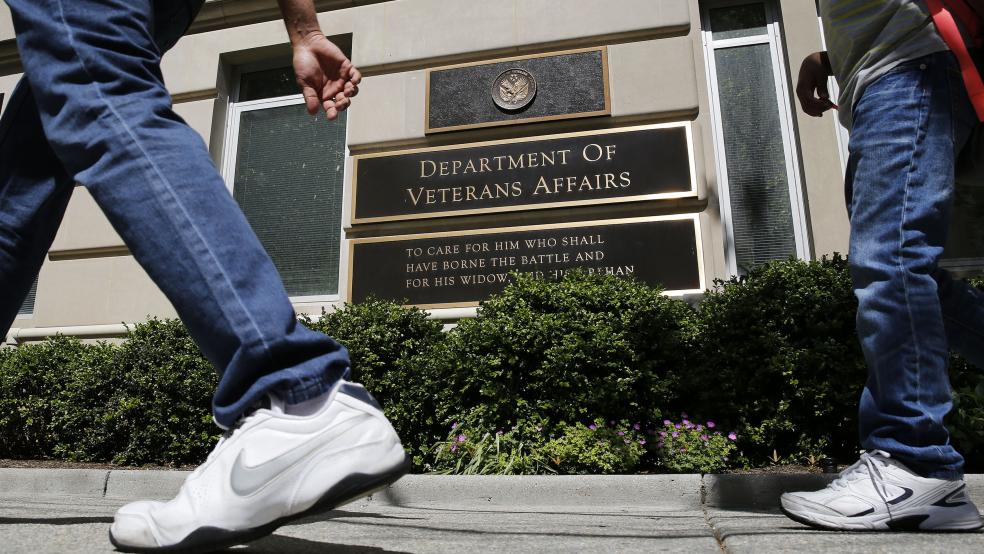There seems to be a huge disconnect between the nation’s mounting concerns about suicides among U.S. veterans of the Middle East wars and the Department of Veterans Affairs’ shabby treatment of tens of thousands of veterans who left the military under less than ideal terms.
Early last year, Congress belatedly approved a measure providing $22 million over the coming five years to bolster VA programs to combat a rash of suicides among vets that have averaged about 1 suicide a day.
Related: Congress Finally Confronts Veteran Suicide Epidemic
The tragic stories of emotionally scarred veterans struggling to reenter society, find jobs and shelter are legion. More than half of the 2.7 million veterans of Iraq and Afghanistan are struggling with physical or mental health problems that often lead to debilitating depression – and suicide -- according to some experts.
So a new report this week that growing numbers of veterans have been ruled ineligible for VA benefits, including mental health counseling, because they had been discharged from the service with a less than “general” rating, is a stunning revelation.
The report, by the advocacy group Swords to Plowshares, analyzed VA data going back 70 years and discovered that roughly 6.5 percent of all veterans of the conflict in Iraq and Afghanistan have been excluded from basic veterans’ services, such as counseling, job placement and housing assistance, because of a bad discharge.
The exclusionary rate for those who served in Iraq and Afghanistan is nearly comparable to the 5.5 percent benefit exclusion rate of veterans who served in the First Gulf War between 1991 and 2001. But it is nearly four times the rate of World War II era veterans (1.7 percent) and more than twice the 2.8 percent rate of Korean War era soldiers. The study was first reported by The New York Times on Tuesday.
Related: Coburn’s Last Act Was Blocking a VA Suicide Prevention Bill
In short, more than 125,000 Iraq and Afghanistan veterans have been cut loose and must fend for themselves because of what is known as “bad paper” or an unsatisfactory discharge from the service because of misconduct or sub-par performances. Yet the congressionally mandated regulations fail to take into account that post-traumatic stress and other emotional problems that may have directly contributed to the “bad paper” in the first place.
Researchers say that veterans who received less-than-satisfactory discharges are more likely to commit suicide.
“This report exposes a historically unprecedented abandonment of American veterans,” wrote Bradford Adams, a lawyer and veterans’ advocate, who produced the report. “Veterans with bad paper discharges are at a greater risk of homelessness and suicide, yet it is nearly impossible for such veterans to navigate the bureaucracies to get VA health care or homelessness prevention services.”
The controversy reaches back to the 1944 G.I. Bill. The Servicemen’s Readjustment Act denied troops who were convicted of serious crimes or had dishonorable discharges to qualify for veterans’ benefits. Congress at the time wrote in some exceptions to the law to provide officials with some discretionary latitude, such as for dealing with those who were deemed undesirable or “other than honorable.”
Related: America’s Vets: More Jobs, More Help, More Suicides
However, as The Times explained, the soaring share of ineligible veterans of the Iraq and Afghanistan conflict is largely due to the military’s increased reliance on “other-than-honorable discharges.” Using that designation has become the most expeditious way for the military to drum emotionally troubled men and women out of the service without having to provide them with time-consuming and costly treatment.
A top VA official told the newspaper that his agency would explore ways to better serve veterans within the boundaries of the law and department regulations. However, the VA is still struggling to rebound from a major scandal a year ago in which hundreds of veterans reportedly died while waiting many months to receive treatment at VA health care centers.
Among other key findings of the new report:
- Marines are nearly ten times more likely to be denied VA services than members of the Air Force are.
- Mental health and combat have little effect in determining eligibility for benefits.
- A stunning three out of four vets with “bad-paper discharges” who served in combat and suffer from Post-Traumatic Stress Disorder are denied eligibility for benefits by the Board of Veterans Appeals.
Related: Americans Sour on VA after Health Care Scandal
The report urges the VA to revise its regulations “to more accurately reflect congressional intent that only those who served ‘dishonorably’ be excluded.” The agency should also require the consideration of “positive and mitigating factors,” and not arbitrarily disqualify veterans for minor infractions. Finally, the report calls on the VA to grant veterans access to basic healthcare while it deliberates on veterans’ eligibility claims.





